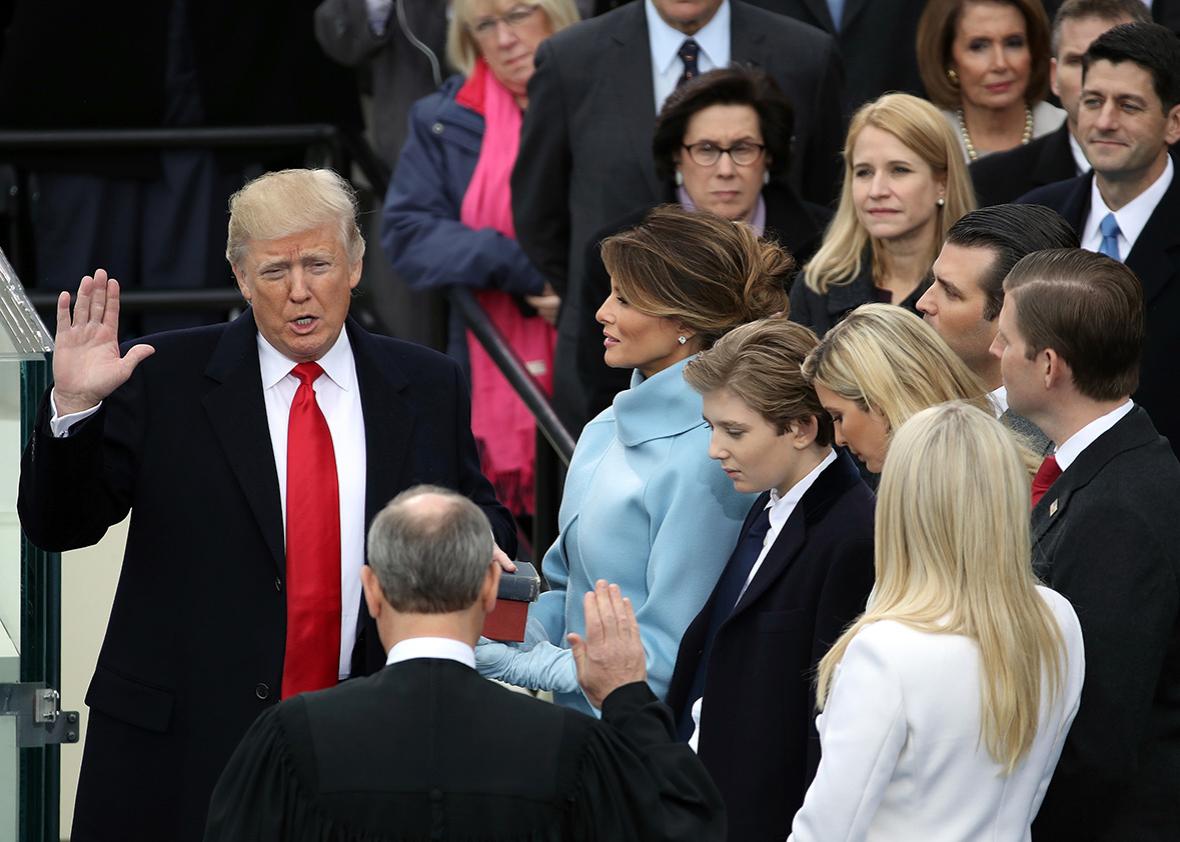“The forgotten men and women of our country will be forgotten no longer. Everyone is listening to you now,” said the newly minted American president in his inaugural address. “You came by the tens of millions to become part of a historic movement, the likes of which the world has never seen before.”
This is not true. Donald Trump is a minority president who takes office despite having lost the national popular vote by substantial margins. Even at this stage, he remains a deeply unpopular figure, with the lowest favorability ratings of any new chief executive since we started counting. But it does reflect something that is true of the Republican Party.
There has been, for the past 30 years, a tension at the heart of the GOP. Its leaders have been conservatives, heirs to the anti-government traditions of Goldwater and Reagan, skeptical of (if not opposed to) the legacy of the New Deal.
Some of the people who vote for Republicans, especially the affluent and the educated, are cut from the same cloth. But many aren’t. And in the past decade, the ones who aren’t have grown as a share of the Republican electorate. They are white. Many do traditional blue-collar work. They live in older, largely segregated suburbs. Some are working class; others have a hold on middle-class life. But they all feel insecure, both in the face of rising costs—of health care, of housing, of education—and a rapidly changing, increasingly multicultural world. They vote for Republicans, but they don’t hate government—they back programs such as Social Security and Medicare. They just want government to work for the so-called deserving. They’re hostile to mass immigration and deeply respectful of law enforcement and other authority.
Trump is the first Republican president to speak directly for those voters. He is their avatar, the man who embodies their anxieties and resentments. He spoke for them as a candidate; he spoke for them as a nominee; and he speaks for them now, as president of the United States. And in his inaugural address—which adopted the rhythms and rhetoric of his campaign for a national audience—he exalted them as “the people,” the rightful “rulers of this nation.”
First, however, Trump painted a picture of the United States as a kind of hellscape, marred by constant violence and deprivation. “Mothers and children trapped in poverty in our inner cities, rusted-out factories, scattered like tombstones across the landscape of our nation, an education system flush with cash but which leaves our young and beautiful students deprived of all knowledge,” said Trump, channeling a vision ripped from the United States of his youth, when cities were in deep industrial decline and crime actually ravaged the nation. “This American carnage,” he said, “stops right here and stops right now.”
This led into the nationalist core of Trump’s address. He blasted a Washington that has “defended other nations’ borders while refusing to defend our own.” He attacked American leaders for enriching “other countries while the wealth, strength, and confidence” of our own has “dissipated over the horizon.” From this day forward, Trump asserted, “It’s going to be only America first, America first.”
“America First” has a specific history, as a nativist and isolationist slogan, popular among Americans who resisted entry into World War II and were associated with the demagoguery and anti-Semitism of Charles Lindbergh. And it’s a fitting slogan for Trump, who has channeled those same resentments and who now deploys them as the leader of the most powerful nation on Earth. “We must protect our borders from the ravages of other countries making our products, stealing our companies, and destroying our jobs,” said Trump.
There is an irony in all of this. Trump has assembled a Cabinet drawn from the plutocratic elite of the country. His populism will be administered by billionaires and hedge-fund managers. His legislative agenda of tax cuts and small government will spark massive upward redistribution to the wealthiest Americans. Trump began his address by roasting those in politics who have “reaped the rewards of government while people have borne the cost.” That, in a real sense, describes his administration. And his speech gives us an idea of how he will resolve the tension: by doubling down on the language of “us” and “them,” of a blemish-free people besieged by foreign and hostile forces.
Trump ran a divisive, ethno-nationalist campaign for president centered on the idea that some Americans had more standing than others and that “American” was a category defined more by race and ethnicity than by belief in the nation’s ideals. It’s the idea that animated his birtherism as well as his attacks on Muslim Americans and Hispanic immigrants. Trump didn’t bring that explicit racism to his inaugural, and he even gestured toward the nation’s diversity. But the stark tone of the speech—the broad attack on foreignness, the disregard for notions of liberty, equality, and constitutionalism—shows how that essential chauvinism isn’t far from the surface.
Most new presidents promise unity. What Donald Trump promises, instead, is a kind of dominance. A pledge that, after eight years of Barack Obama, Washington now belongs to his voters, “the people.” Welcome to the age of Trump. Welcome to the age of “America First.”
